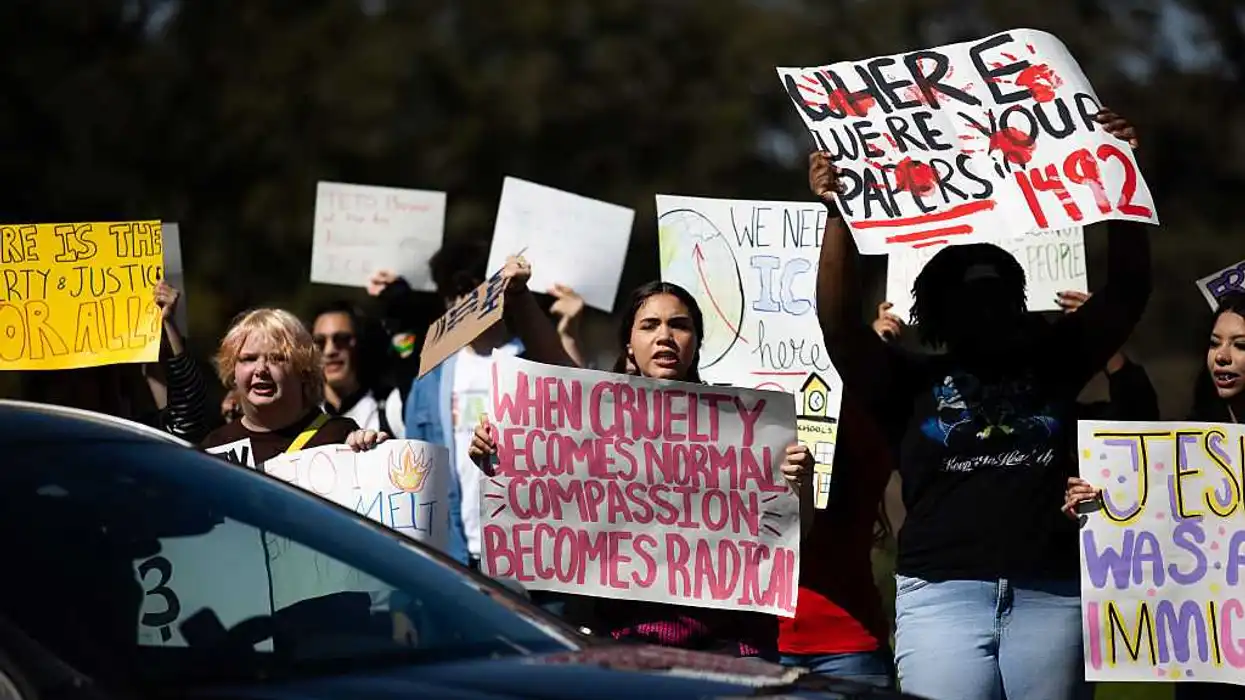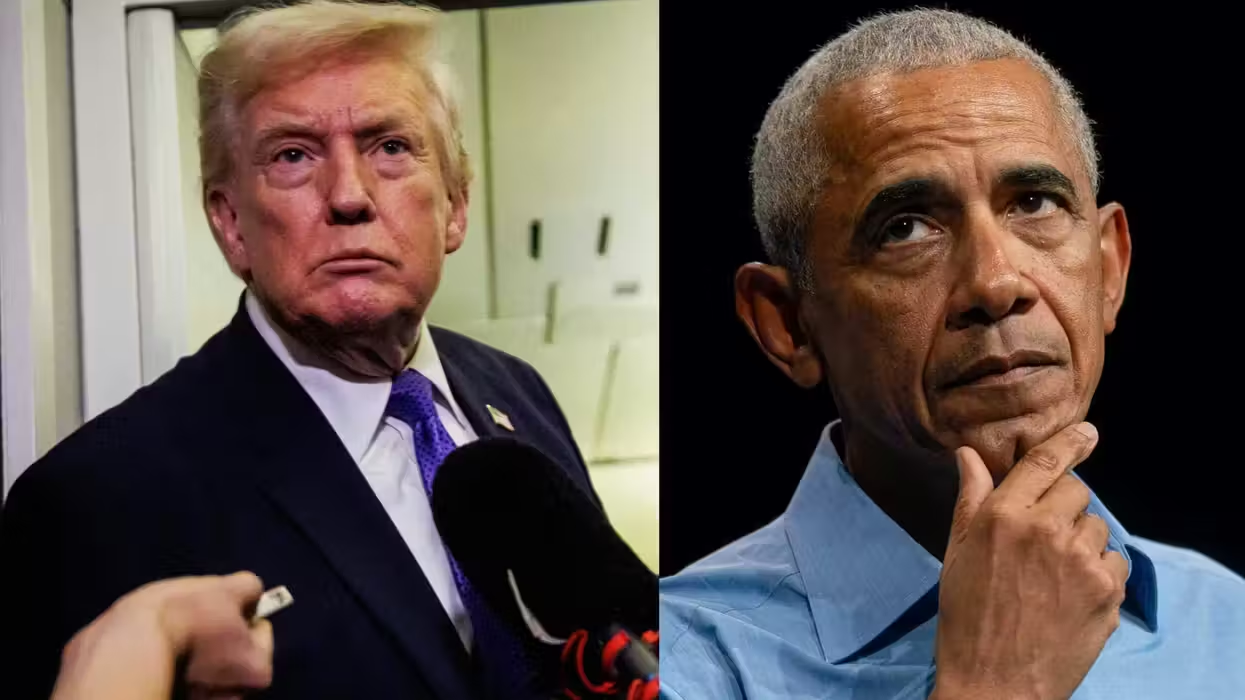
© 2026 Blaze Media LLC. All rights reserved.
Libertarian Party Accepts Bitcoin Donations (And Guess Who Owns Millions of Dollars Worth of the Digital Currency)
April 12, 2013
"The future of Bitcoin is, like all currencies, going to come down to trust."
 A sign announces a proprieter's loyalty to Bitcoins, where they are also accepted for payment, at a pub on April 11, 2013 in Berlin, Germany. Bitcoins are a digital currency traded on the MTGox exchange, and the value of the virtual money fluctuated from USD 260 per bitcoin down to USD 130 per bitcoin Wednesday and recovered somewhat in trading Thursday. (Photo: Sean Gallup/Getty Images)
A sign announces a proprieter's loyalty to Bitcoins, where they are also accepted for payment, at a pub on April 11, 2013 in Berlin, Germany. Bitcoins are a digital currency traded on the MTGox exchange, and the value of the virtual money fluctuated from USD 260 per bitcoin down to USD 130 per bitcoin Wednesday and recovered somewhat in trading Thursday. (Photo: Sean Gallup/Getty Images)
Even though Bitcoin's all-time high recently crashed, some are continuing to defend the digital currency that has seen a recent spike in popularity and public awareness. In fact, the unregulated currency, which has been called a "Libertarian fantasy," is actually accepted as a form of donation by some affiliating themselves with the Libertarian party.
As the Atlantic Wire pointed out, Libertarian candidates for state senate in North Dakota and Vermont began accepting Bitcoins in the fall of 2012. More recently, the Libertarian Party of Canada began accepting the digital tender in March. The Libertarian Party of Canada's press release regarding its new form of donations stated:
The most significant advantages of Bitcoin are that the amount of Bitcoin is finite, and the software is open source (meaning anyone can read and understand exactly how the software works). Consequently, the amount of Bitcoin cannot be expanded –all current day government currencies are expanding their currency. Expanding currency, also called ‘quantitative easing’ or ‘inflation’ is the worst way that government makes money – the other two are through taxes and borrowing. Inflation hurts lower income families the most. The Bank of Canada is continually expanding the supply of Canadian dollars and the Canadian dollar is continually losing value. As the dollar is devalued, the price of goods and services tend to go up, resulting in an insidious tax on the productive working citizen.[...]
Bitcoin is an option that Canadians should be free to use in financial exchanges, free from all governmental regulatory meddling.
One caveat to donating via Bitcoin in Canada is that it is considered the same as a cash donation and based on current laws, only a maximum of $20 Canadian dollars can be donated in this fashion.
 In this April 3, 2013 photo, Mike Caldwell, a 35-year-old software engineer, holds a 25 Bitcoin token at his shop in Sandy, Utah. Caldwell mints physical versions of bitcoins, cranking out homemade tokens with codes protected by tamper-proof holographic seals, a retro-futuristic kind of prepaid cash. With up to 70,000 transactions each day over the past month, bitcoins have been propelled from the world of Internet oddities to the cusp of mainstream use, a remarkable breakthrough for a currency which made its online debut only four years ago. (Photo: AP/Rick Bowmer)
In this April 3, 2013 photo, Mike Caldwell, a 35-year-old software engineer, holds a 25 Bitcoin token at his shop in Sandy, Utah. Caldwell mints physical versions of bitcoins, cranking out homemade tokens with codes protected by tamper-proof holographic seals, a retro-futuristic kind of prepaid cash. With up to 70,000 transactions each day over the past month, bitcoins have been propelled from the world of Internet oddities to the cusp of mainstream use, a remarkable breakthrough for a currency which made its online debut only four years ago. (Photo: AP/Rick Bowmer)
As of Friday morning, according to Mt Gox, Bitcoin was valued at just around $80 per Bitcoin. This is a sharp fall from the high of $266 it saw earlier in the week and its high around $94 last week. On Thursday due to fluctuations, Tokyo-based Mt. Gox, temporarily suspended trading for what it described as a 12-hour "market cooldown."
What many want to know at this point is if Bitcoin will survive or sustain some of the popularity it has seen within the last couple months.
"At this point I would say yes, since it has before,"Chief Market Strategist for the ConvergEx Group Nicholas Colas wrote in an email to the Associated Press. But he noted that, unlike previous oscillations, Thursday's collapse was taking place in the full glare of international media attention.
"A lot more people know about Bitcoin than during the prior problems," he said.
For Colas, the most important thing to keep in mind was that Bitcoins suffer from the same weakness as any other form of money. If people increasingly believe they're not worth anything, then they're not worth anything - no matter how clever the currency's design.
"The future of Bitcoin is, like all currencies, going to come down to trust," he said.
And although Bitcoin ownership is largely anonymous -- that's much of the appeal to users -- a famous set of entrepreneurs recently came out stating they own $11 million worth of the digital currency, as of Thursday morning.
The Winklevoss twins, Cameron and Tyler, who are famous for their row with Mark Zuckerberg over who truly founded Facebook, have been mining Bitcoins since the summer and, according to the New York Times, have one of the largest portfolios of the money.
 Tyler and Cameron Winklevoss attend the Nautica Men's Fall 2013 fashion show during Mercedes-Benz Fashion Week at The Stage at Lincoln Center on February 8, 2013 in New York City. (Photo: Michael Loccisano/Getty Images for Mercedes-Benz Fashion Week)
Tyler and Cameron Winklevoss attend the Nautica Men's Fall 2013 fashion show during Mercedes-Benz Fashion Week at The Stage at Lincoln Center on February 8, 2013 in New York City. (Photo: Michael Loccisano/Getty Images for Mercedes-Benz Fashion Week)
As owners of a significant stake in the $1.3 billion market (again this was as of Thursday), the Winklevoss twins defend the recent drop, like other Bitcoin believers, as being expected growing pains.
"People say it’s a Ponzi scheme, it’s a bubble," Cameron Winklevoss told the Times. "People really don’t want to take it seriously. At some point that narrative will shift to ‘virtual currencies are here to stay.’ We’re in the early days."
Tyler Winklevoss added that in the four years since Bitcoin became official -- it was launched as an idea in the 1990s and officially established in 2009 -- "it has yet to be discredited." But he admitted, "We could be totally wrong, but we are curious to see this play out a lot more."
--
Related:
- Digital Currency Sees 'BitCrash' After All-Time High
- Confused by Digital Currency? This 3-Minute Video Has the Basics About What You Need to Know About ‘Bitcoins’
- What Are Bitcoins and Could They Endanger the Global Economy?
- There’s Now a Currency That’s Up 152% – $1 Billion Total Value – And You Should Know About It
- Property for Sale in Canada But There’s a Techie Catch for How Exactly It Can Be Bought
The Associated Press contributed to this report.
Want to leave a tip?
We answer to you. Help keep our content free of advertisers and big tech censorship by leaving a tip today.
Want to join the conversation?
Already a subscriber?
more stories
Sign up for the Blaze newsletter
By signing up, you agree to our Privacy Policy and Terms of Use, and agree to receive content that may sometimes include advertisements. You may opt out at any time.
Related Content
© 2026 Blaze Media LLC. All rights reserved.
Get the stories that matter most delivered directly to your inbox.
By signing up, you agree to our Privacy Policy and Terms of Use, and agree to receive content that may sometimes include advertisements. You may opt out at any time.






